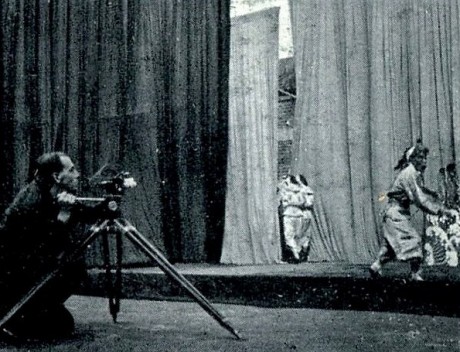… and the euphoric discovery of “direct cinema” (you will never make me say “cinema verité”) and on the crew’s day off, I photographed a story I didn’t completely understand. (Chris Marker)
JUXTAPOSITIONEN
I et interview med Chris Marker i Libération, 5. marts 2003 spørger intervieweren: ”… Hvorfor har De indvilliget i at udgive nogle af Deres film på DVD, og hvordan foretog De valget? ”
Der er tale om en to Arte / CNC udgivelser, en med med La jetée, 1962 og Sans soleil, 1983 og en med Le tombeau d’Alexandre, 1992, sat i album med Alexandre Medvedkines Le bonheur, 1934. Alle franske originalversioner med engelsk speak og undertekster. Marker svarer intervieweren:
”Tyve år skiller La jetée fra Sans soleil. Og andre 20 år skiller Sans soleil fra nu. Hvis jeg skulle tale i den persons sted, som lavede disse film, ville det ikke længere være et interview, men en seance. I virkeligheden tror jeg ikke jeg valgte eller accepterede: nogle talte om det, og det blev gennemført. At der var et særligt slægtskab mellem disse to film var noget, jeg var klar over, men jeg mente ikke, jeg behøvede at forklare det – indtil jeg fandt en lille anonym tekst i et program i Tokyo, hvor der stod:
’Snart vil rejsen være til ende. Det er først på det tidspunkt, at vi vil vide om juxtapositionen af billeder giver nogen mening. Vi vil forstå, at vi har bedt med film, som man må på en pilgrimsrejse, som vi må hver gang, vi har været i nærheden af døden: på kattenes begravelsesplads, stående foran den døde giraf, sammen med kamikaze-piloterne i take-off øjeblikket, foran guerillaerne dræbt i uafhængighedskrigen. I La jetée, ender det dumdristige eksperiment at se ind i fremtiden med døden. I bearbejdningen af det samme tema 20 år senere, har Marker ved bønnen overvundet døden.’
Når man læser dette, skrevet af en, man ikke kender, en som ikke kan vide noget som helst om filmenes tilblivelse, rammes man af en særlig følelse. Et eller andet er sket…” (Notat, 2008, ABN)
GODARD NAILED IT
The interview that Allan Berg refers to in his Danish language article Juxtapositionen is in English and is one of the very rare conversations that are printed with the enigmatic French master. The interview is wonderful reading. Here are two bites to evoke your hunger for more:
On film and television: ”Godard nailed it once and for all: at the cinema, you raise your eyes to the screen; in front of the television, you lower them. Then there is the role of the shutter. Out of the two hours you spend in a movie theater, you spend one of them in the dark. It’s this nocturnal portion that stays with us, that fixes our memory of a film in a different way than the same film seen on television or on a monitor.”
And on how La Jetée came into being: “I was filming Le Joli mai, completely immersed in the reality of Paris 1962, and the euphoric discovery of “direct cinema” (you will never make me say “cinema verité”) and on the crew’s day off, I photographed a story I didn’t completely understand. It was in the editing that the pieces of the puzzle came together, and it wasn’t me who designed the puzzle. I’d have a hard time taking credit for it. It just happened, that’s all.” (Blogpost 25-03-2008 by Tue Steen Müller)
BIOGRAFI
Chris Marker hedder rigtigt Christian Francois Bouche-Villeneuve. Han blev født i Paris den 29. juli 1921, og han bor der nu, hvor han ikke mere farer omkring. Han hører ellers til forrige århundredes store rejsende. Han er forfatter, fotograf, filminstruktør, multimediakunstner. Wikipedia opregner 69 egne filmtitler, 19 samarbejder om film (blandt andre Makavejev, Guzman, Ivens, Resnais), 8 bøger.. Intervieweren spørger: ”Film, fotoromaner, cd-rom, videoinstallationer, er der noget medium, De ikke har prøvet?” Marker svarer: ”Ja, gouache.” Han, nævner Wikipedia, deltog i 2. verdenskrig på makiens side, begyndte derefter at skrive og lave film. Han rejste i mange lande og dokumenterede, hvad han så. Les statues meurent aussi, 1953, som han instruerede sammen med Alain Resnais, var blandt de tidligste antikolonialistiske film. Han blev internationalt kendt for La jetée i 1962, den film har siden været kult blandt cineaster og har inspireret en række instruktører. Mest kendt nok er Twelve Monkeys, 1995 og dens udspring i Markers værk. Han afsluttede Sans soleil i 1982. Den film udvidede voldsomt dokumentarfilmgenrens begrænsninger. Det er rejsebrev og essay og filosofiske kommentarer i én lang vibrerende collage af mest japanske og afrikanske optagelser. Med dette værk begyndte Chris Markers optagethed af digital teknologi, og den førte over et par film til den interaktive cd-rom Immory, 1998, som han lavede for Centre Pompidou og Owls at Noon Prelude: The Hollow Men, en multimedieproduktion for Museum of Modern Art, New York i 2005. Le tombeau d’Alexandre, 1992 er en på én gang ydmyg hyldest til filmhistorien og den russiske mester Alexandre Medvedkine og et selvbevidst bud på genren filmbiografi med arkivmateriale og vidneudsagn og fortællerstemme. Marker udvider også den genre på det voldsomste. (Notat, 2008, ABN)
CHRIS MARKER 1921 – 2012
Chris Marker died today, filmkommentaren has written far too little about him, but here is a quote from the obituary of today in Guardian, please read the whole article and below also two links to what we have written about him, in English and Danish:
“The essay film, a form pitched between documentary and personal reflection, exploring the subjectivity of the cinematic perspective, has now become an accepted genre. Jean-Marie Straub, Danièle Huillet, Jean-Luc Godard, Errol Morris and Michael Moore are among its main recent exponents, but Chris Marker, who has died aged 91, was credited with inventing the form.
Marker’s creative use of sound, images and text in his poetic, political and philosophical documentaries made him one of the most inventive of film-makers. They looked forward to what is called “the new documentary”, but also looked back to the literary essay in the tradition of Michel de Montaigne. Marker’s interests lay in transitional societies – “life in the process of becoming history,” as he put it. How do various cultures perceive and sustain themselves and each other in the increasingly intermingled modern world?” (Blogpost 30-07-2012 by Tue Steen Müller)
http://www.guardian.co.uk/film/2012/jul/30/chris-marker
VOD RETRO
DOCAlliance now launches a scoop: 7 films by legendary master of the essay film, French Chris Marker (1921-2012). Quote from the presentation:
DAFilms presents a cross section of the work of the writer, photographer and explorer, ranging from Sunday in Peking from 1956 through his most renowned documentary essay Sunless and The Pier which inspired Terry Gilliam to make his cult film 12 Monkeys to one of the most famous cyberpunk films Level Five from 1997. Read an interview with Bamchade Pourvali, French film critic and author of Marker’s biography. Le temps de la rétrospective est arrivé!
The films are (English titles): Sunday in Peking (1956), Letter from Siberia (1957), Level Five (1997), Sunless (1983), Junkopia (1981), Description of a Struggle (1960), The Pier (1962). Sunless = Sans Soleil and The Pier = La Jetée being the most famous.
Dear readers, the cost for a monthly subscription to DOCAlliance is 5€!!!
(07-06-2017 / Tue Steen Müller)
https://dafilms.com/program/628-chris-marker
https://www.filmcomment.com/article/marker-direct-an-interview-with-chris-marker/
DOCAlliance: CHRIS MARKER
I had a talk with colleague Allan Berg yesterday. He remembered the time of repertory cinemas, where classics could be seen. Nowadays this is mostly the film historical job for the cinematheques. BUT, we agreed, some vod’s have classics on their repertory and when it comes to high quality, nothing compares to DOCAlliance.
That now launches a scoop: 7 films by legendary master of the essay film, French Chris Marker (1921-2012). Quote from the presentation:
“DAFilms presents a cross section of the work of the writer, photographer and explorer, ranging from Sunday in Peking from 1956 through his most renowned documentary essay Sunless and The Pier which inspired Terry Gilliam to make his cult film 12 Monkeys to one of the most famous cyberpunk films Level Five from 1997. Read an interview with Bamchade Pourvali, French film critic and author of Marker’s biography. Le temps de la rétrospective est arrivé!
The films are (English titles): Sunday in Peking (1956), Letter from Siberia (1957), Level Five (1997), Sunless (1983), Junkopia (1981), Description of a Struggle (1960), The Pier (1962). Sunless = Sans Soleil and The Pier = La Jetée being the most famous.

Dear readers, the cost for a monthly subscription to DOCAlliance is 5€!!!
(07-06-2017 / Tue Steen Müller)
https://dafilms.com/program/628-chris-marker
CHRIS MARKER: DIMANCHE À PÉKIN (1956)
Chris Marker er på optagelse, det er 1955, det er i Kina… Det var jo tidligt efter krigen, så det var tidlige scener fyldt med ærbødighed og håb for den unge revolution han optog. Jeg ved ikke om han var alene, det må jeg have fundet ud af, men jeg ser at Agnes Varda er krediteret for Kinakyndig medvirken. Og det har sat sig smukke spor så det nye Kina det smukke lille essay igennem spejler sig i og på mange mange måder ses fortsætte og udvikle de bevarede elementer af den gamle kultur som Marker lærte at længes mod i sin barndoms billedbøger og fortællinger om drager og kejsere og sværdsvingende atleter og dybt disciplinerede boksekæmpere.
I den velskabte korte film, som kom ud af det som et stykke fejlfri cinematografi, mønstergyldig i samtiden, virker alle elementer kongenialt med Markers mesterligt klassisk akademiske optagelser uden lyd, den gennemtænkte nykomponerede musik af Pierre Barbaud, de muntert præcise lydeffekter ved Arkady (groupe des XXX) lagt på den kunstfærdige lydside af Antonio Harispe i sin tids design, Fracine Gruberts yderst elegante klipning , produceren Madeleine Casanovo-Rodriquez også fra (groupe des XXX), hendes sikre hånd og først og sidst den kloge gennemløbende stemme henover, som Marker har skrevet i sin tænksomt formulerede patos med sommerfuglens lethed.
Chris Marker: Dimanche à Pékin, Frankrig 1956 (restaureret i 2013), 19 min. Kan ses disse dage på:
https://dafilms.com/film/10152-sunday-in-peking
OM AT ERINDRE
“At the same time, Marker merrily messes up the boundaries between individual and cultural memory by acknowledging that his observations have been heavily coloured by his own experience of popular culture – from the storybooks of his childhood to the newsreels and fiction films consumed throughout his life. The outer townships of the city with their banners and tiny lanes are the “Peking of the movies”; the Forbidden City is the “Peking of Jules Verne and Marco Polo…”. We understand what he means instantly – an understanding that is dependant on our own collective experience of Western culture, now used to interpret a filmmaker’s personal memories written down over 50 years ago.” (Louise Sheedy, Senses of Cinema, september 2009)
Sheedys kommentar er argumenteret antropologi-videnskabelig orienteret, men tag ikke fejl, hun er helt indforstået, se videre her:
A CHAIN OF LOGIC
“… Later, the narrator describes girls dancing and singing a tune that would stay with him for the rest of the day. This is accompanied by a montage of little dances; firstly girls in uniform, playing a kind of game, then another group of older girls, dancing in a circle. One of the raised arms is the matched to the arm of a man pulling a cart, waving to someone across the street. In the next shot we see a policeman with arm raised as he directs traffic. All these links form a chain of logic that again suggests the performative dynamic between the tourist or visitor and the local – a separation that, while not insurmountable, needs to be acknowledged.”
http://sensesofcinema.com/2009/cteq/all-the-thrills-of-the-exotic-collective-memory-and-cultural-performance-in-chris-markers-dimanche-a-pekin/
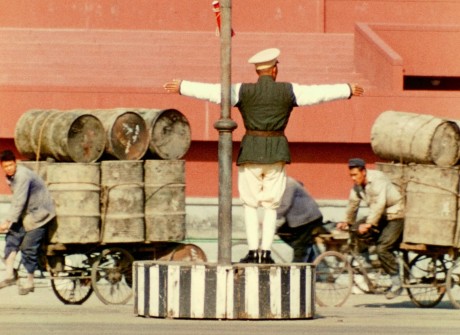
(11-06-2017 / Allan Berg Nielsen)
LA JETÉE (1962)
Det var i 2008. Jeg havde været til festival Cinéma du réel, og jeg skulle jo have noget med hjem til min filmklub. Noget fra Paris. Noget rigtigt. Jeg fandt det i Pompidoucentrets butik. En nyrestaureret dvd udgave af den udødelige film om byen, om kærligheden og om døden. Om tiden og om krigen og om det umulige i at undslippe. Dette billede er fra afsnittet om mødet og forelskelsen og foråret i Paris. Det er et still fra location.
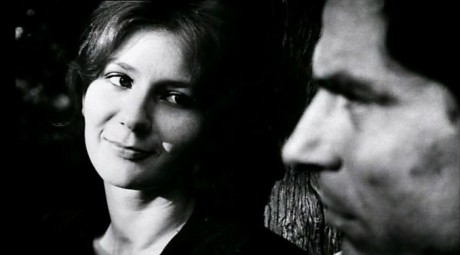
Jeg havde et andet Paris billede med også. Det er et still fra samme film. Byen lige før udslettelsen.
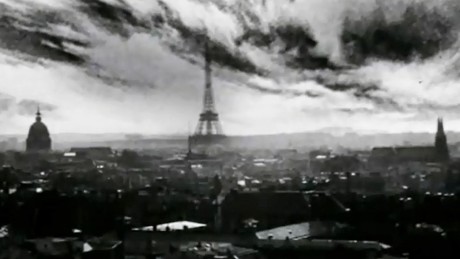
BIOGRAF
Filmen består af sådanne stills. Den er optaget med Pentax 24×36, bortset fra en enkelt, naturligvis berømt filmscene med øjne som bevæger sig, optaget med et Arriflex 35 mm lånt en enkelt time. Marker kalder det en filmroman. Han hylder i en lille tekst i programhæftet sin barndoms lommebiograf Pathéorama med serier af lysbilleder, ”… mais ces scènes étaint des plans, magnifiquement reproduits, de films célèbres, Chaplin, Ben Hur, le Napoléon d’Abel Gance.” En onsdag aften dengang så vi filmen i FOF filmklubben her i byen. Jeg var en begejstret og forvirret oplægholder, det her var filmhistorie og levende nutid på samme tid, det var noget rigtigt, noget dybt betydningsfuldt og noget mærkværdigt fra min ungdom, og jeg skrev et par notater til min præsentation af La jetée og to Marker film yderligere, som jeg selvfølgelig heller ikke havde forstået ret meget af, det mærkede man tydeligt, mærkede jeg tydeligt.
VOD
Så er der gået næsten ti år. Nu har jeg chancen igen disse dage med DOCAlliances Chris Marker serie. Jeg ser som den første La jetée nu igen. Og jeg tænker med det samme på Tarkovskijs Solaris, 1972, begge film handler jo om i en nutids ramme at rejse tilbage i erindringen, i Tarkovskijs til en nær fortid, i Markers films rammes fremtid tilbage til sin egen tid, til hans tid. Og begge films indhold er erindring om kærlighedstab, erfarede erindringer må jeg tro.
De overlevende fra det atomangreb, som har udslettet Paris, har dybt under jorden indrettet et samfund styret af gangsterorganiseret eksperimentel videnskab i et forsøg på med tidsrejser at overleve. I et sådant laboratorium foregår rammefortællingens kammerspil. Hovedpersonens gentagne vellykkede rejser til filmens egen tid består af en 1962 byfilm romance skildret ved lyriske stills, som jeg aldrig glemte, for de var også min dannelses tid.
Men der er tillige fra den frygtelige fremtid i intimteaterscenens laboratorium under den udslettede by drømte rejser frem i en fremtid, hvor Paris er genopbygget, hvor hovedpersonen efter sit besøg får at vide han er velkommen, men finder tilværelsen der ligeså frygtelig. Så nej, han er forelsket i sin egen tid, forelsket i forelskelsen, i kvinden, i kunsten, i haverne i byen, i det at vandre sammen med hende på det naturhistoriske museum, hvor fortiden er fascinerende, men trygt konserveret, forelsket i det Paris, som et atomangreb om kort tid vil udslette, så det ligner Hamburg 1944, Hiroshima 1945.
STORY
“This is a story of a man marked by an image of his childhood. The violent scene which upset him, and whose meaning he was to grasp only years later, happened on the the main pier at Orly, Paris airport some time before the outbreak of World War III… “
Chris Marker: La jetée, Frankrig 1962, 29 min. Fortsæt med filmen på: https://dafilms.com/film/10153-the-pier
(10-06-2017 / Allan Berg Nielsen)
MED FORSIGTIG TØVEN
Hov, jeg ser at DOCAlliances retrospektive Chris Marker serie stadigvæk kører på deres streamingtjeneste. Jeg havde ellers belavet mig på at skrive om den post festum nu længe efter den begyndte og vi skrev om den her på Filmkommentaren, Tue Steen Müller en introduktion og jeg om en enkelt af filmene, hvorefter jeg gik i stå. Til nu midt i sommerferien.
For det var med forsigtig tøven jeg nærmede mig Chris Marker og hans film. Han er for mig en myte, den mand som skaffede råfilm til optagelserne i Chile og bagefter fik dem smuglet ud og Sara Thelle fortalte mig engang jeg besøgte hende i Paris, at den nu gamle sky mand handlede på hendes marked og boede der i nærheden med sin kat, som han sendte et portræt af, når en redaktør skulle bruge et af ham, en kat hvis katteliv i lejligheden han lavede film om, film han lagde ud på YouTube, film som jeg så og fascineredes af på grund af myten og auraen og så dette særlige autoritative greb, som jeg mærker hos visse instruktører, og det ikke på grund af myten. Det er jeg sikker på; og Sara Thelle forærede mig nyrestaurerede dvd udgaver af andre, længere og mere ambitiøse film som jeg så, men ikke forstod ret meget af, men blev optaget af nu osgså på grund af myten om disse berømte værker selvfølgelig, men alligevel især på grund af deres konsekvent sikre og gennemarbejdede storhed. Jeg var klar over, der var mesterværker iblandt.
Og så blev Tue Steen Müller og jeg som nævnt for nogen tid siden opmærksomme på DOCAlliances retrospektive Chris Marker serie og jeg tog mig på at at se de film.
Denne og de forhåbentlig følgende blogindlæg er små og spredte notater fra disse gennemsyn, blot en slags kvittering jeg bestemt er forpligtet på. For det var mere omvæltende i mig end det vil lykkes mig endog bare at antyde i det følgende som nu kommer, altså alligevel ikke post festum. Og det er godt, ferietid kan være frigjort tid, tid til at se og læse om det som ikke nåedes aktuelt. Ferietid er fordybelsesforsøgets langsomme tid, reprisens tid, gentagelsens tid. Det kan nås endnu, og det kan kun anbefales, her er linket til streamingen:
https://dafilms.com/program/628-chris-marker
(17-07-2017 / Allan Berg Nielsen)
LETTRE DE SIBÉRIE (1957)
A documentary about this vast and in those days very mysterious Soviet area. Above all as André Bazin wrote: “A human and political geography essay about Siberian reality. Vivid writing inlighted by the camera work. The author always holds together intelligence, poetry and whimsical imagination.”(DA editor)
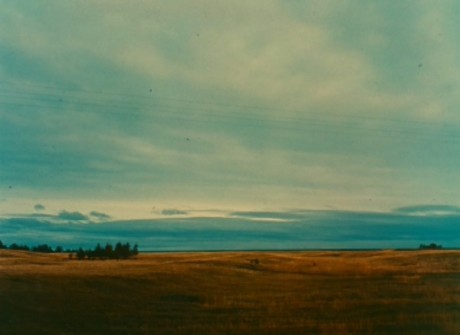
Filmen er et altså et essay over den sibiriske kultur, og Marker tager godt fat om det personlige udgangspunkt, hans fremstilling er i rejsebrevets form. Hans billedside er landskabsfotografi og tegnefilm.
Jeg kan godt lide de sikre greb i filmens åbning, autoriteten. Kameraet introducerer panoreringen som jeg venter vil blive gennemgående, den er langsom med den lave horisont trygt hvilende i en evighed som tilhører dette landskab, hvis stemning en koncertsanger uddyber med en sang om ræven, ørnen og rensdyret, hvem landet her tilhører. Men det vil ændre sig…
Chris Markers voice-over er causerende i sin tids kommentarstil, men den er omhyggelig arbejdet ind i en anderledeshed, som også har overrasket for et halvt århundrede siden. Ja, den samlede filmkonstruktion udnytter den vedtagne, den konventuelle form for dokumentarfilm som jeg kender fra britterne og fra danskerne i perioden – men Marker tilføjer en ånd og en klogskab og en personlighed og en alvor, som jeg ikke finder magen til i disse værkers oftest småborgerlige folkeoplysende og velmenende kulturforståelse og hele antropologi bundet ind i ministeriers og skolers ønsker. Hans samfundsforståelse og hans menneskesyn må komme fra andre territorier, tænker jeg som jo har set senere af hans film før denne.
Frankrig 1957, 57 min. På DOCAlliance i engelsksproget version. (ABN)
DESCRIPTION D’UN COMBAT (1960)
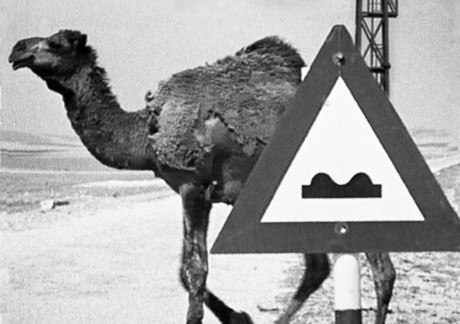
The earth sign, the water sign, the human being sign – this is the promise land. This document, focusing on Israel and its struggle (fight) for sovereignty and identity continues Marker’s line of political testimonies. A meditative commentary on how a new state is built hovers over elusive impressionist images, hiding opportunities to make discoveries, which, albeit short-lived, are penetrating the limits of illusion. A literary essay combines with a documentary image to make a hypnotic film, which was awarded Golden Bear at the Berlin Film Festival(DOCAlliance synopsis)
Description d’un combat var i 1960 en etableret naiv (vrai naive) opdateret og aktuel dokumentarfilm om Israel, i dag er det et tidsdokument for mig i en eftertid, i en ny aktualitet hvor optimismen er afløst af mistro. Mistro til alt og alle. Og vigtigst for mig et kunstnerisk, et filmhistorisk dokument i Chris Markers samlede værk, som i sin filmessayskrivning peger helt frem til i dag: sådan er den opmærksomme, tænkende filmskrift bundet i sin skribent til al tid, og filmen er derved i sin erkendelses kerne tidløs.
Filmens emne er staten og samfundet og folket Israel tilbageskuende 15 år, men fæstnet i 1960’er nuet. Temaerne er at rejse, at være turist, at være observerende dokumentarfilm fotograf at se, at tænke over det at rejse, tænke over det at se og tænke over det at tænke. Og jeg slipper ikke historien, for gør jeg det blot et øjeblik, falder den sindrige filmkonstruktion sammen for mig og jeg tror det bare er en gammel folkeoplysende rejsefilm og jeg forstår ikke det jeg ser og hører, opdager ikke essayet. Mærker ikke dybden, klogskaben, skønheden.
Elementerne er omhyggeligt fotograferede filmscener, en lang række lige så omhyggeligt fotograferede sort/hvide stills, begge en overdådighed af af fint klassisk gadefotografi, landskabsfotografi i lange, rolige studier ofte kun med musikken og endelig en voice-over, en tekst præget ikke kun af viden, men af klogskab og dette skrevet ind i en høj litterær kvalitet bundet i sin tid og sit sted, 50’ernes filosofi, politik, litteratur, malerkunst, musik og filmmiljø på venstre Seinebed i Paris. Min viden om det skarptegner min forståelse af det filmessay elementerne i forening skriver. Endnu mere, havde jeg vidst mere.
Afslutningssekvensen samler filmens holdning, dens fremtidshåb for Israel: store børn i en skole står ved i koncentreret tavs opmærksomhed ved staffelier og maler. Det samler sig om en enkelt pige som maler, den kommenterende stemme bliver til en tale, en højtidelig tale om landets og hendes fremtid, se på hende gentager den dæmpet retorisk udsagn for udsagn i en opsummering… vrai naive.
Frankrig 1960, 57 min. På DOCAlliance i engelsksproget smukt restaureret version:
https://dafilms.com/film/10156-description-of-a-struggle
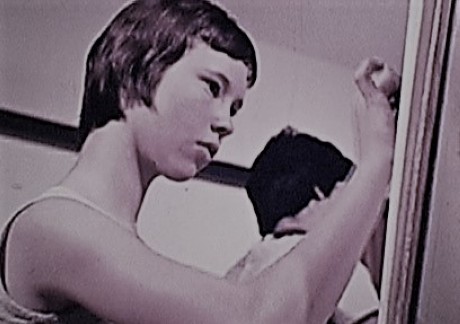
(22-07-2017 / Allan Berg Nielsen)
LEVEL 5 (1997)
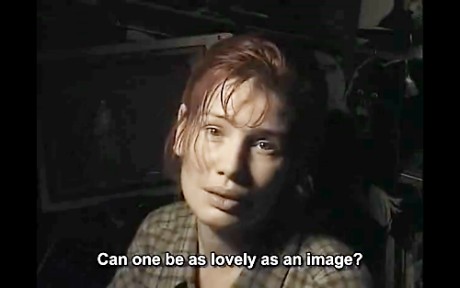
French computer programmer Laura tackles a challenging video game. She researches World War lI’s bloody Battle of Okinawa, the last pre-nuclear face-off between the US and Japan, interviews with Japanese experts and witnesses, including filmmaker Nagisha Oshima, cause Laura to reflect deeply on her own life and human kind. Will she be able to go beyond Level 5? A fascinating humanistic reflection on war, memory and history. (DOCAlliance synopsis)
This documentary uses fiction to address shared memory of the Battle of Okinawa. Laura tries to get to the most difficult stage, level 5, of the computer program left behind by her late husband. In this are revealed statements by Rev. Kinjo Shigeaki, who witnessed the mass suicide at Tokashiki Island; documentary footage of people jumping to their deaths from cliffs on Saipan Island; and the image of a soldier who lost his memory due to the Battle of Okinawa, portrayed in John Houston’s film Let There Be Light, which was banned from public viewing for thirty years. (Chris Marker’s synopsis)
Chris Markers film, både denne og de andre i den retrospektive serie, bliver tilsyneladende stående tilgængelige på DOCAlliances streaming. Det giver mig mod til at fortsætte mit forsøg på at se og skrive om så mange af hans film som muligt. Jeg vil gøre det på den måde, at jeg lader uregelmæssigheden i dette letsindige foretagende skinne igennem i mine blogindlæg, som jeg pludseligt afslutter på steder, jeg i skrivende øjeblik bliver nødt til, fordi kræfter og tanker svinder…
Men jeg sætter alle nye tekster ind i blogindlægget Chris Marker Collected posts & notes on his works som så lidt efter lidt vokser og bliver ved med at leve op til sin titel, mening og bestemmelse, ligesom Filmkommentaren.dk som blog (= ”weblog”, altså journal på nettet) forsøger lever op til sin genre, altså at notere Tue Steen Müllers, vore skrivende gæsters og mine kommentarer til filmene vi ser. Nu til Markers Level 5 fra 1997.
Det første billede er en hånd, hendes og-eller hans, med en computermus som bevæger sige søgende på sit underlag og på skærmen, som også er del af og snart bliver til filmens titelsekvens, som er en kaotisk collage af natlige bybilleder set højt oppe fra, skærmbilleder opløst i punkter og streger, klip med flag der blafrer i vinden, klip med et tv-interview med William Gibson og så kvindestemmen, med det samme uforglemmelig smuk, med denne tekst (på fransk) som er én lang replik, en af den slags scener i film jeg elskede lang tid før Markers, jeg tænker på Godards film, nogle af Bergmans film: ”What can these be, the playthings of a mad God who made us to build them for him? Imagine Neanderthal man glimpsing a flash of city at night, all motion and light. He can not tell what it means. He have had a poetic vision, all motion and light. A sea of lights. He can not unravel the the images that lands in his mind like birds swift, unreachable birds. Thoughts, memoires, visions are the same to him, a scary hallusination. Such was William Gibson’s vision when he wrote Neuromances and invented Cyperspace. He saw the Sargasso Sea full of binary algae…”
Det her er så et nødvendigt, men også godt sted for mig at standse for nu og tænke sig om, se efter igen (det er jo det streamingen giver mig mulighed for) og om lidt skrive videre. Jeg ved der nu kommer en kærlighedshistorie…
(10-10-2017 / Allan Berg Nielsen)
LEVEL 5 (1997) /2
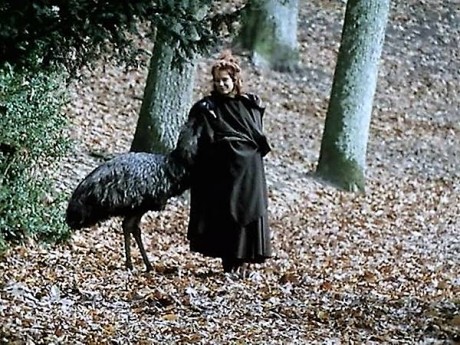
Jeg bruger disse sene efterårsuger al min opmærksomme tid, som næsten alle dage er pinagtig sparsom, til at læse bøger, den ene efter den anden, fra begyndelse til slutning. I går kunne jeg mere end forventningsfuld hente Julie Mendels Relikvie. Og jeg begyndte langsomt forfra, og på side 5 stod der som det eneste et citat i kursiv: ” ‘A prayer slipped quietly into life without interrupting it’ – Fra filmen ‘Sans Soleil’ af Chris Marker”.
Jeg fik en tydelig dårlig samvittighed, jeg har jo disse mange, mange dage svigtet Chris Markers film, som jeg havde været i gang med at se på min langsomme måde og lige så tøvende lave notater til. Jeg var midt i hans Level 5 og havde derefter tænkt at gå i gang med netop Sans Soleil. Nu må jeg lade Relikvie ligge til jeg er færdig med Level 5 og i det mindste har genset Sans Soleil.
Så det blev således ikke ”om lidt” jeg skrev videre. Det bliver måske nu, som er noget senere, meget senere, jeg skriver. Jeg var sidst midt i titelsekvensen og jeg havde forstået, der i kvindens store indledende monolog ved siden af den essayistiske overvejelse om internettets virkelighed befinder sig en kærlighedshistorie. Kvinden (som jeg fra DOCAlliance’s synopsis ved hedder Laura, men her, inde i filmen ved jeg det ikke endnu) siger videre i sin monolog i det samme billede, en collage af storbyoptagelser ved nat og lysende punkter og linjer i en computerskærm:
”… On that image we Neanderthals grafted our own visions our pitiful scraps of information. But none of us knows what a city is.” Så klippes der til Laura, og jeg ser, det er hende der taler, som bærer denne fortællestemme, denne lange replik. Hun fortsætter:
”This is the stuff you used to write…” Her kommer den hun taler til ind, et “you”, som er i handlingen, men som jo også kan være et skrivende publikum som identificerer sig, finder en at holde med. I handlingen er det hendes mand, hendes kollega og kæreste, tænker jeg, hendes stemmes blide og fortrolige tone får mig til at tænke det. Det er her kærlighedshedshistorien begynder.
”You wrote at night, late, sitting at the computer before you logged out. I’d find it in the morning when I logged in. You had been working at your game, I was about to work on my book. Computer at night, bar howls’ delight, computer in the morning in the morning, tomcat’s warning. We took it in turns, a shift for you, a shift for me, a shift for us both…”
Det var titelsekvensen. Nu klippes der til titelskiltet: “Catherine Belkhodja dans Level 5”. Nu ved jeg hvad kvinden hedder uden for filmen, og selvfølgelig får jeg lyst til at undersøge hvem hun er, finde ud af om hun havde relation til instruktøren, også uden for filmen. Og det styrkes af, at hun efter sin første undersøgelse af sin mands efterladte computerspil meddeler: ”… Jeg vil give Chris alt dette materiale”, og instruktøren kommer så her ind i filmen, på fotroligt fornavn, og herefter har jeg også instruktørens beretning som en del af fortællestemmen, og i min forsvinden i filmen, i min henrivelse, tænker jeg ikke på at instruktøren jo også har skrevet Belkhodjas del, at han tillige har konstrueret computerspillet.
Chris Marker lægger en i sit væsen nøgtern politisk, antropologisk, psykologisk og moralfilosofisk kommentar til det materiale, Catherine Belkhodjas mand har efterladt, som hun har fundet til ham og det udgør herefter et lag ved siden af Belkhodjas følsomme, naive, charmerende, ja, i hendesfremstilling aldeles gribende kærlighedserindring, en filmisk virkelighed, hvor hun hedder Laura får jeg på et tidspunkt at vide. Lauras eget lag og erkendelsesarbejde er at lære level 5 at kende, hun og hendes mand havde i en fortrolighedsleg inden hans død defineret level 1 og 2: ”In conversation, I still mention the levels we’d give people when someone came in and said I’m Catholic, Communist or Anarchist or some other bigotry we said ”Level One” and lough. When they were funnier or wittier we’d say ”Level Two”, but we never went higher…” Level 3-5undersøger Laura herefter i dramaet, i scener som disse, som kunne hedde ”Papegøjens metode (efterligning), ”Parken med fuglene” (sprog) (FOTO), ”Selvmorderens opringning” (handling)”.
… ja, dette er og bliver føljeton, så jeg må nu skrive ”fortsættes”…
(30-11-2017 / Allan Berg Nielsen)
Frankrig 1997, 105 min. På DOCAlliance i den smukt restaurerede franske version med engelsksprogede tekster:
https://dafilms.com/film/10159-level-five (Streaming af hele filmen)




